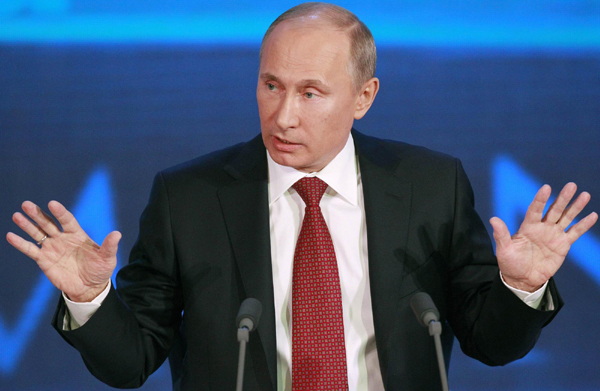Putin: China-Russia ties at record high
Updated: 2012-12-21 10:27
(Xinhua)
|
||||||||
MOSCOW - Russian President Vladimir Putin on Thursday held his eighth press conference on major domestic issues and foreign relations in 12 years and the first of its kind since his return to the Kremlin this May.
Putin, in front of some 1,200 Russian and foreign journalists, started off by reviewing the results achieved in economic and social spheres in the country.
 |
|
Russia's President Vladimir Putin speaks during his annual news conference in Moscow, Dec 20, 2012. [Photo/Agencies] |
During his direct conversation with reporters, which lasted four and a half hours, the president outlined his ideas on domestic and international issues.
Russian analysts said Putin's answers indicated that his diplomatic strategy in his third presidency has become more pragmatic as Moscow intends to get closer to the east and mend ties with countries at variances.
CHINA-RUSSIA TIES AT HIGHEST LEVEL
Putin said China-Russia relations are at the highest level in history, when answering Xinhua's question about how he sees bilateral ties between the two countries.
Russia looks forward to developing joint projects with China in areas such as big-hull civilian aircraft manufacturing, Putin said, adding that bilateral cooperation in investment and finance were also very promising.
"This is obvious that Russia-China relations have developed at a fast pace this year. They were at the highest level ever and they keep going in that direction," Yakov Berger, a professor at Russia's Far East Institute, told Xinhua.
Putin also set new goals to bolster China-Russian relations, suggesting that some part of the countries' bilateral trade would be conducted in national currencies.
"Relationship with China is the best example of what two countries could achieve if both of them want it. Still, there are the new challenges in bilateral relations, because traditional structure of their economic exchanges became insufficient," said Alexander Fedorovsky, an expert from the Institute of World Economy and International Relations of Russian Academy of Science.
- Putin says China-Russia relations at highest level
- Russia's 2012 arms exports to reach $14b: Putin
- Moral values critical to Russia's future: Putin
- Population growth, moral values critical to Russia's future, says Putin
- Putin: Russia not advocate of Syrian govt
- Putin's address on Russia assuming G20 presidency

 Relief reaches isolated village
Relief reaches isolated village
 Rainfall poses new threats to quake-hit region
Rainfall poses new threats to quake-hit region
 Funerals begin for Boston bombing victims
Funerals begin for Boston bombing victims
 Quake takeaway from China's Air Force
Quake takeaway from China's Air Force
 Obama celebrates young inventors at science fair
Obama celebrates young inventors at science fair
 Earth Day marked around the world
Earth Day marked around the world
 Volunteer team helping students find sense of normalcy
Volunteer team helping students find sense of normalcy
 Ethnic groups quick to join rescue efforts
Ethnic groups quick to join rescue efforts
Most Viewed
Editor's Picks

|

|

|

|

|

|
Today's Top News
Health new priority for quake zone
Xi meets US top military officer
Japan's boats driven out of Diaoyu
China mulls online shopping legislation
Bird flu death toll rises to 22
Putin appoints new ambassador to China
Japanese ships blocked from Diaoyu Islands
Inspired by Guan, more Chinese pick up golf
US Weekly

|

|






